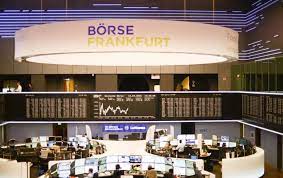|
A webinar our director, Matthew Reynolds, participated in. The webinar discusses the dual-listing process for the Frankfurt Stock Exchange and why there is a substantial benefit for Australian and Canadian companies to dual-list in Frankfurt and engage with European retail and strategic investors.
0 Comments
The success of German Mittelstand companies
Much like a sturdy oak tree with deep roots in fertile soil, German Mittelstand firms are anchored in robust principles that nurture enduring success. These companies navigate the complexities of global markets with remarkable agility, exemplifying an ethos of innovation melded with time-honoured traditions - the bedrock of their worldwide acclaim. Essence of the Mittelstand Model At the heart of the German Mittelstand philosophy lies a quintessentially German blueprint for business - a compound of deeply ingrained pragmatism, stewardship, and long-term thinking. These firms, often family-owned and with a strong regional footprint, are renowned for coupling nimble management with formidable technical expertise, yielding a niche-market domination that defies their often-modest size. Commitment to workforce skilling and community integration stands as a testament to a sustainable growth ethos, which has perennially fostered resilience and competitiveness on the world stage. Defining Mittelstand Characteristics Mittelstand companies epitomise strategic focus, operational flexibility, and a profound commitment to quality over volume. These enterprises are characterised by strong family ownership, a steadfast loyalty to local regions, and a propensity for sustained, independent growth. Rooted in prudent financial management and a deep-seated culture of innovation, Mittelstand firms skilfully navigate market fluctuations, ensuring long-term viability. Adaptability and Innovation Inherent agility catalyses Mittelstand resilience. The Mittelstand model epitomises adaptability and innovative prowess. Central to this ethos is an ability to respond swiftly to market fluctuations and technological shifts. German Mittelstand companies consistently invest in research and development, leading to revolutionary product offerings that secure competitive advantage. Importantly, this mindset of innovation is not an occasional endeavour, but a continuous commitment incorporated into the corporate ethos. Change is embraced as a perpetual innovation catalyst. German Mittelstand firms exhibit remarkable foresight in - and preparedness for - future market shifts. By prioritising long-term strategic planning over short-term gains, and harnessing a culture of continuous improvement, these entities maintain their edge. In doing so, they demonstrate a proactive rather than reactive approach to market dynamics. Strategic agility underpins sustainable competitive success. With a history of pivoting effectively to meet emergent commercial challenges while upholding exceptional standards of product quality, the German Mittelstand remains a paradigm of evolutionary excellence far into the 21st century. This adaptability has underpinned their enduring success and the indelible mark they continue to imprint upon the global business landscape. Long-term Strategic Focus The German Mittelstand epitomises the principle of a long-range strategic outlook in their business operations. Intergenerational ownership structures frequently buttress a commitment to sustained growth, rather than maximising short-term shareholder returns. Moreover, their strategic horizons often extend well beyond the next financial quarter or fiscal year, embedding resilience and adaptability into their corporate DNA. Forethought and careful planning allow these enterprises to invest significantly in research and development, reinforcing their technologically advanced position within niche markets globally. Such foresight ensures that the Mittelstand continues to thrive, even in fluctuating economic climates. Cultivating a Skilled Workforce The profound prowess of German Mittelstand companies in cultivating a skilled workforce is pivotal to their success. They harness the strength of a well-informed, supremely trained employee base which solidifies their competitive edge. Crucially, the dual education system, integrating vocational training and academic learning, underpins this skilled labour force. As a lynchpin of the German educational fabric, it marries theoretical knowledge with practical expertise, producing workers of unparalleled proficiency within their respective fields. This emphasis on continuous training ensures a perennial inflow of adept professionals, ready to excel in the Mittelstand's innovation-driven environment. Employee Retention Strategies Employee retention is pivotal in maintaining the competitive edge of Mittelstand companies.
Sustaining a corporate culture that values each team member is key to retaining top talent. Niche Market Leadership The Mittelstand model's hallmark is its unwavering commitment to niche market leadership, which translates into a formidable competitive advantage. These companies identify and dominate specialist segments of markets, largely due to their acute focus on product quality and customer satisfaction. heir strategy centres around deep specialisation in particular fields, allowing them to innovate and adapt with agility. As these companies grow organically within their niches, they not only set the standards but often become synonymous with the sectors they lead. This leverages their reputation, ensuring long-term stability and sustained profitability in a globalised economy where differentiation is key to success. Specialisation and Expertise Mittelstand companies are distinguished by their profound industry specialisation and domain expertise.
By maintaining a strong emphasis on specialisation, these entities uphold a competitive edge that is difficult to replicate. Family-Owned Dynamics A quintessential element of the Mittelstand ethos is the pervasive influence of family ownership. These entities often thrive under a continuity of leadership that spans generations, infusing the enterprise with a profound sense of stewardship and long-term vision. Such a framework promotes a deep-rooted, intrinsic understanding of the business fabric and its core values. It also fosters a unique organisational culture, where employees are seen not merely as cogs in a wheel but as part of an extended corporate family. This relational capital, when harnessed effectively, contributes significantly to the robust resilience and agility that characterises these companies, thereby enabling them to meticulously navigate and flourish in the fluctuating tapestry of global markets. Governance and Succession Planning Efficient governance structures are the bedrock upon which Mittelstand companies construct their enduring success. Board compositions often weave intricate threads of family involvement with external expertise, assuring a balance of legacy knowledge and innovative perspectives. These firms tend to adopt a meticulous, strategic approach when addressing succession. Embracing both nepotism and meritocracy, they seek heirs within the family who portray exceptional aptitude and are deeply ingrained with the company's ethos. This ensures leadership continuity that respects the founding principles while identifying opportunities for progressive evolution. In instances where family successors are not viable or optimal, Mittelstand businesses are pragmatic in their approach. They may appoint seasoned professionals from within or outside the firm who are capable of upholding foundational values and driving future growth, thus circumventing potential disruptions. To secure their future, Mittelstand firms often engage in proactive succession planning, sometimes decades in advance. Such foresight allows the smooth transition of power and maintains operational stability, reflecting their dedication to sustainable progress. Advanced planning mitigates the risks associated with abrupt leadership changes, establishing robust frameworks that nurture long-term prosperity. Balanced Growth and Risk German Mittelstand companies exhibit a formidable balance, mitigating risk while pursuing consistent, sustainable growth across many decades. Their strategies embody a cautious expansion, committing to incremental improvements and prudent investments that protect their core markets and competencies. This blend of conservative financial management and measured development underpins their resilience in volatile markets. Such an approach often eschews rapid scaling in favour of stability. It ensures that expansions are thoroughly planned, meticulously executed, and aligned with the Mittelstand ethos of long-term sustainability and steadiness. Consequently, these entities do not over-leverage, thereby avoiding the pitfalls of aggressive growth strategies. However, their aversion to risk is not synonymous with stagnation. Reliably, Mittelstand firms invest in innovation and technology, albeit in a controlled manner (typically reinvesting profits instead of seeking external capital) to retain their competitive edge. It's a harmonised approach balancing the new with the tried-and-tested. Their growth trajectory is frequently anchored to vertical integration or diversification within related sectors, allowing them to reinforce authority within their niche, increase efficiencies, and reduce dependency on external suppliers. This self-reliance mitigates external risk factors and empowers operational fluidity. Ultimately, the Mittelstand philosophy embodies a measured approach to business. Rather than chasing short-term gains, these firms concentrate on steady growth that safeguards their legacy and secures their future impact in the global economy. This prudent approach positions them well to cope with economic uncertainties and market fluctuations. Global success When Mittelstand companies compete globally, they prefer for full control over foreign operations. This is due to fact they view the relationship with the customer as something too important to delegate. Some 97% of these companies have their own presence in the U.S. market. And more than half of them have successfully entered the Japanese market and established countrywide service networks there. According to Harvard Business Review “Nowhere else in the world do companies with revenues in the range of $50 million to $2 billion have such strong international networks under their own control”. Examples Examples of German Mittelstand companies are: Rimowa, Jungbunzlauer, Strama-MPS, Sartorius, SMS Group and Heidelberger Druckmaschinen Frankfurt Stock Exchange Basics The Frankfurt Stock Exchange (FSE) is one of the world's largest trading centres for securities. With a history dating back over four centuries, it has evolved into a crucial nexus for global finance. At its core, the FSE acilitates the buying and selling of stocks, bonds, ETFs, and other securities, serving as a vital artery for the lifeblood of investment. Its electronic trading system, Xetra, is renowned for efficiency, transparency, and accessibility. Known by the acronym "FWB" for "Frankfurter Wertpapierbörse," it represents the pinnacle of German financial markets, playing a pivotal role in European and international economies. Understanding its Global ImpactThe Frankfurt Stock Exchange (FSE) is a major force in international finance, orchestrating global capital flows with unmatched expertise. It is a touchstone of market confidence and economic vitality. Strategically positioned in the heart of Europe, the FSE wields formidable influence as a pivotal hub for continental and international investments, shaping economic landscapes beyond German borders.change is pivotal in setting global benchmark indices. By virtue of its scale and sophistication, the FSE acts as a global barometer for financial health, reflecting wider economic trends. Its impact, therefore, is felt by businesses and investors who look to its performance as a signal of broader market trajectories. Navigating the Trading Floors Trading on the venerable floors of the Frankfurt Stock Exchange (FWB) entails engaging with a bustling epicentre of financial activity and sophistication. It is here where equity and debt securities are vigorously traded, weaving a web of complex transactions underpinned by strict regulatory standards. Moreover, the floor trading section synonymous with historical exchanges continues to thrive, albeit in a modernised context. Known as the "Börsensaal", it accommodates traders who prefer the tactile nuances of face-to-face transactions. Here, market makers and specialists operate, providing liquidity and fair pricing within the regulatory confines established by the BaFin (Federal Financial Supervisory Authority). Adept navigation of these trading floors demands an appreciation for the intricacies at play. Participants must be versed in the various segments and products available, as well as in the pertinent regulatory landscape. Regular updates on compliance, technology, and market trends are indispensable for those who endeavour to operate effectively within this prestigious marketplace. Key Players and ListingsThe Frankfurt Stock Exchange is a powerhouse of financial activity inundated with an extensive array of listings, encompassing over 11,000 shares and securities. The pivotal players on this stage include behemoths of the German DAX index, a bellwether for the economic health of the nation. Among them are industry giants from the automotive, pharmaceutical, and technology sectors, each playing a crucial role in driving market dynamics. Apart from these titans, a plethora of international firms leverage this platform, tapping into a broad investor base for enhanced visibility and liquidity. Additional stature is lent to the exchange by the inclusion of myriad bonds, funds, and derivatives, broadening the spectrum of investment opportunities. Such financial instruments serve as testament to the exchange’s global significance and its function as a nexus for capital markets. Blue Chip Giants on the DAXThe DAX, Germany's premier stock market index, features the most venerated names in the industrial and commercial landscape, representing esteemed blue-chip companies. It acts as a barometer of the nation's corporate prowess and economic vigour. DAX constituents, known for their large market capitalisation and stability, embody Germany's industrious heritage and innovation. They are investor favourites owing to their relative resilience. Positioned within this elite cadre are entities such as Volkswagen AG, Bayer AG, and Siemens AG, whose outreach and operations span global markets, entrenching their status as domestic and international titans. Their performance has a palpable impact on the index, mirroring Germany's economic tenor and yielding critical insights for investors worldwide. Each member of the DAX is meticulously vetted, ensuring only companies with a track record of excellence and a commitment to sustainable growth are listed. This bestows upon the Frankfurt Stock Exchange a prestigious aura as a domicile for premium investment opportunities, befitting entities that are colloquially dubbed "heavyweights" in their respective industries. Under the Spotlight: MDAX, SDAX, and TecDAXThe Frankfurt Stock Exchange curates specialised indices for diverse market segments.
Distinct from their DAX counterparts, these indices echo market trends in mid-sized, small-cap, and tech-focused segments. Trading Mechanisms and ProcessesThe Frankfurt Stock Exchange (FSE) operates on an electronic trading platform known as Xetra. This system facilitates a seamless order book, where trades are executed with high precision and minimal human intervention. It stands as a testament to the efficiency and transparency valued in modern financial markets, where latency and error margins are aggressively minimised. In the labyrinth of the FSE's operation, a rigorous "continuous auction" system prevails. Orders are matched according to price-time priority, ensuring fairness in transactions. During designated times, the exchange adopts an "auction principle" to determine opening, intraday, and closing prices. Within these temporal boundaries, cumulative orders build to pinpoint the equilibrium price point, reflecting the true market sentiment. Timing and price converge in the art of trade execution. The execution landscape on the FSE is vivified by Algorithmic Trading, where high-frequency trading firms and institutional investors deploy advanced computational systems to execute orders at unprecedented speeds. These algorithms accentuate the need for robust risk management protocols and compliance with the regulatory measures instituted by the exchange. The Role of Xetra in Digital TradingXetra is the electronic trading system central to the Frankfurt Stock Exchange, propelling efficient digital trade execution.
Through Xetra, the Frankfurt Stock Exchange secures its reputation for fostering an advanced and accessible financial marketplace. Dual-Listing on Frankfurt Stock Exchange Over 13,000 global companies listed on NASDAQ, ASX, TSX, LSE and all major global exchanges have a dual-listing on the Frankfurt Stock Exchange. This facilitates ability for global investors to purchase the company's shares without foreign exchange risks, large transaction fees and in European trading time zone. Here at Austlinx we have developed a relationship with DGWA - Gemany's leading boutique investment and investor relations advisory for global small-mid cap companies. We assist companies with a market maker and manage the dual-listing process. German and European investors follow global equities closely especially in the areas of critical raw materials, hydrogen, clean energy, biotech, tech and cleantech. Copper, lithium, nickel, cobalt, manganese and rare earths are currently in particular demand in Germany and Europe, as the number of new gigafactories being built in Europe increases.
If Europe wishes to reduce its dependence on China it will require mineral resources from Australia, Canada, Brazil or African countries. https://www.deutschland.de/en/topic/business/mineral-resource-cooperation-with-australia-partner-for-germany Prime Minister Anthony Albanese says Australia must stay in the "global race" for jobs, as he prepares to detail a taxpayer-funded incentive scheme for advanced manufacturing and clean energy projects Good video from 2023 from Austrade about entering the German market for Australian technology stocks |
AuthorMatthew Reynolds is an accountant, management consultant and business development expert living in Germany. Archives
July 2024
Categories |
Austlinx - global knowledge and reach, with local personalised service



 RSS Feed
RSS Feed